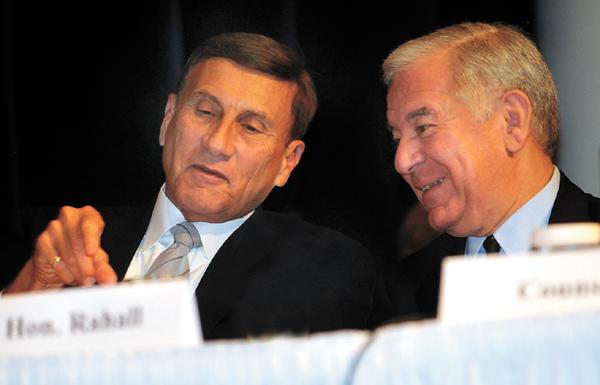Before crafting their $556 billion transportation proposal, Obama administration officials toured the country, holding a series of listening sessions to hear what people wanted in a long-term transportation bill. Now, the House Transportation and Infrastructure Committee is doing the same thing -- but don’t expect committee Republicans to come to the same conclusions as the administration.

Whether or not they are willing to back a large, ambitious, reform-packed bill, Republicans are hearing that action is needed urgently. That was the message at the first field hearing, held in West Virginia this Monday. Both GOP and Democratic members of the committee heard from officials representing the state DOT, a contractors association, two highway authorities and the Rahall Appalachian Transportation Institute (named for West Virginia Democrat Nick Rahall, ranking member of the T&I committee and representative of the district where the hearing took place).
Rahall presided over the hearing, held in a small theater in Tamarack, which bills itself as a center for West Virginia artisans but could also be described as an overbuilt highway rest stop. Taylor Kuykendall, a reporter for the local Register-Herald, said the audience was sparse, as it was not an open town hall but rather a forum only for the committee’s invited guests. Kuykendall estimated there were about 20 people in attendance, and only four members of the committee were present – Rahall, Chair John Mica (R-FL), Rep. John Duncan (R-TN) and Rep. Mazie Hirono (D-HI).
Kuykendall summarized some highlights of the hearing in a report earlier this week:
[Paul Mattox Jr., Commissioner of Highways at the West Virginia Department of Transportation] supported progress with the “critical” highway authorization act. He also stressed the need for public transit.
“Many West Virginians, particularly in the rural areas, are transit-dependent and utilize these services to get to work, the doctor, shopping and to take care of the necessities of life,” Mattox said. “The need for continued transportation investment in West Virginia is greater now than ever.”
Duncan also brought up concerns about economic development being slowed by environmental regulators. He said costs caused by environmental regulation have made the expense of projects “out of whack.”
“I know all these environmental radicals come from very wealthy and very upper-income families, but they are really hurting the poor and low-income groups in this country,” Duncan said.
The issue, hotly contested in the state and nationally, briefly brought about the only apparent point of disagreement among the committee members on Monday. While many are pushing to limit the power of agencies such as the EPA, others are hoping industry and economic development is closely regulated to prevent environmental destruction.
“I think I have a slightly different perspective on these so-called ‘environmental radicals,’” Hirono said. “I’m not a fan of environmental radicals, but I am a fan of people who care about our air quality and water quality.”
Mattox noted that West Virginia maintains 92 percent of its roads – the sixth-largest state-maintained highway network in the country. It finances its roadwork with some unique tools, including partnerships with coal mines as part of the mines’ required land-use plans.
Kuykendall reports that the panelists and lawmakers also discussed the prospect of raising the gas tax to pay for infrastructure needs.
The subject also turned to earmarks, Kuykendall reports, with Rahall defending earmark spending as “an essential function of government.”
“If we were to eliminate such a process as earmarking, we would be empowering those unelected bureaucrats in Washington and/or the President of the United States,” Rahall said, affirming that members of Congress know their districts better and should make those funding allocations.
State Sen. Richard Browning, also the Executive Director of the Coalfields Expressway Authority, said the $186 million in federal money that the state has received to build the proposed 112-mile, four-lane highway has come from earmarks.
The next field hearing was supposed to be held this evening in the Philadelphia suburbs but was just postponed so members can be present in the Capitol to vote on the continuing resolution for the FY2011 budget. We'll let you know when the rescheduled meeting will take place, and we'll bring you the news from the hearing via our friends at the Bicycle Coalition of Greater Philadelphia.





